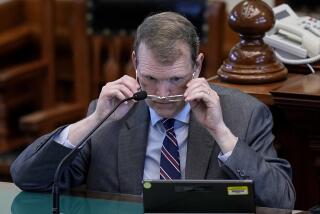Former Bush Aide Defends Role in Texas S&L; Deal
- Share via
WASHINGTON — A former aide to President Bush told a Senate hearing Tuesday that he did nothing wrong when he helped an Arizona insurance executive acquire 15 failed Texas savings and loans and suggested that he is a victim of politics.
“Until this committee began looking into this transaction, I had been very proud of that transaction and the way it had occurred,” Washington lobbyist Robert J. Thompson testified before a Senate Judiciary Committee panel. “I feel very strongly (that) one reason I’m here is that I used to work for George Bush.”
Sen. Howard M. Metzenbaum (D-Ohio), chairman of the Judiciary subcommittee on antitrust, monopolies and business rights, accused Thompson of trading on his former White House relationships to smooth the way for a deal that would cost taxpayers millions more than it should.
“The ability to have access at the highest levels of government can be a very lucrative profession,” charged Metzenbaum, although he said he had uncovered no evidence Thompson had done anything illegal.
A former Republican Party leader in Oklahoma, Thompson was an adviser to Bush when he was vice president and worked as a special assistant to former President Ronald Reagan. He left the White House in 1982 to form a Washington lobbying firm.
In 1988, Thompson helped businessman James Fail buy the thrifts from the federal government in a deal involving at least $1.8 billion in government assistance. Fail consolidated the institutions under the name Bluebonnet Savings Bank of Dallas, and the federal help has allowed him to make them highly profitable.
Metzenbaum has singled out the Bluebonnet deal as one of the worst of the 1988 thrift sales. Questions have centered on whether Fail adequately disclosed a guilty plea by one of his companies, which regulators have said would have disqualified him from bidding, and on Thompson’s role in the deal.
The senator said Tuesday that the Bluebonnet deal will cost the taxpayers $3 billion in subsidies instead of the government’s earlier figure of $1.8 billion. He blamed the additional costs on poor estimates and negotiating by federal regulators, and he urged a renegotiation of the deal with Fail and others who acquired thrifts in 1988.
Congressional critics have charged that in many of those bailouts, government assistance and tax benefits were too generous. But the General Accounting Office said Tuesday that the government would be exposed to potentially expensive breach-of-contract lawsuits if it tried to renegotiate deals without evidence of misconduct.
In his first public appearance, Thompson was accompanied by a lawyer and several public relations people. He was combative in asserting that he had acted properly and that he was under attack chiefly because he once worked for Bush. But Sen. Orrin Hatch (R-Utah), who lobbed soft questions to Thompson, and Sen. Arlen Specter (R-Pa.) objected to that assertion.
“This matter doesn’t involve George Bush,” said Specter. “It involves Robert Thompson.”
For helping Fail understand the regulatory process, Thompson said he was paid a $160,000 bonus and promised 2% of any thrift proceeds that Fail received. But Specter questioned him sharply about other apparent benefits. Among them were a $150,000 personal bank loan to the lobbyist that was acquired by one of Fail’s insurance companies and a mortgage on Thompson’s home.
A few months after Fail acquired Bluebonnet, the thrift approved the $365,000 mortgage for Thompson’s home on Capitol Hill in Washington. The loan had been requested by Harry T. Carneal, an executive with one of Fail’s insurance companies.
An internal auditor at Bluebonnet later raised questions about the loan. He warned that bank examiners would criticize the loan severely because it was made without proper documentation and was for property far outside the institution’s normal market area.
In a follow-up memo, Carneal maintained that he had requested only a normal mortgage loan for Thompson. The lobbyist testified that he had followed all the rules in obtaining the loan.
More to Read
Sign up for Essential California
The most important California stories and recommendations in your inbox every morning.
You may occasionally receive promotional content from the Los Angeles Times.













